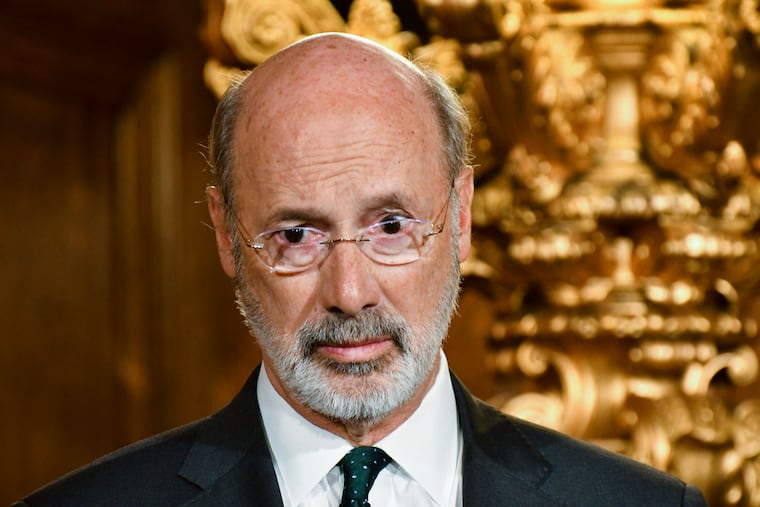By reaching across the aisle, Gov. Wolf has shown that Harrisburg can get things done | Opinion
It is worth stepping back and appreciating (it is Thanksgiving!) the new movement toward compromise and deal-making in Harrisburg, ushered in by an improved version of Governor Wolf and Republican leadership.

Observers of state politics may sense a new feeling in the air: compromise.
It is not easy to pass bills in a divided government. And, for all intents and purposes, Pennsylvanians have voted for divided government, with significant Republican majorities in the state legislature and a Democratic governor who was easily reelected last fall.
This partisan split, between Democratic governor and Republican legislature, could be due to favorable district-drawing by Republicans (who controlled the process after the 2010 census), or to the natural self-sorting of voters, Democrats being hyper-concentrated in cities and inner suburbs. Regardless, lawmakers in Harrisburg have faced the fairly daunting task of passing bills through divided government.
But a new opening may have occurred, with significant bills gaining momentum across the political divide.
Gov. Tom Wolf’s first term, from 2014-2018, was notable for a distinct partisan tone, set by a significant gamble Wolf made in his first year. In his attempt to force a Democratic budget down the throats of the Republican legislature, he became the first governor since the ‘70s to veto the legislature’s full budget, grinding things to a halt in Harrisburg for over nine months.
As the partisan stakes rose and the budget impasse dragged on, Pennsylvania school districts were forced into billions in missed payments or borrowing, and Wolf felt the heat rise and his political capital diminish before finally relenting.
In contrast, in his second term, Wolf seems to be operating as a compromiser.
Electoral reform bill
The first major development from Harrisburg has been an electoral reform bill, the biggest change to Pennsylvania elections since the Great Depression. The bill, which allows for no-excuse absentee balloting, eliminates straight-ticket voting, and extends the voter registration period before elections, has won broad support across the political spectrum.
As always, the pure partisans among us found aspects to gripe about. Many Republicans feel absentee balloting is a cop-out or an invitation for fraud; many Democrats feel straight-ticket voting is essential for busy, low-information voters. And yet, the fact that both sides accomplished a few key objectives — and neither got everything — is key; governing from only one side of the aisle is as unfair to voters as it is politically toxic.
State minimum wage increase
The next major development from Harrisburg is a likely increase of our state’s minimum wage by almost 30%, from the federal minimum of $7.25 to $9.50 over the next two years. This may seem like a modest bump, but it will provide a boost to low-income workers without exploding the cost of employment.
Wolf, and most Pennsylvania Democrats, initially demanded a much higher minimum wage to $12 or $15 an hour, but Harrisburg signaled it was ready for a less radical shift. Incremental change is nothing to shrug at, especially on economics, where our two political camps often have radically different worldviews. Kudos to our leaders for finding common ground.
Commonwealth Court appointment
Even a compromise on a Commonwealth Court appointment shows a propensity for deal-making, though perhaps of the type many voters find unsavory. What could have been behind Wolf’s appointment of a Republican Senate staffer to our state’s Commonwealth Court? That is not clear except to the backroom dealers of Harrisburg.
But if the cost of getting things done is a few private handshakes between the parties, maybe our leaders should retreat to those smoky back rooms.
In this era of instant connectivity, it seems the emotions that win the day play directly into our worst impulses: anger, frustration, and derision. It is easy to say that “nothing gets done” and let our political grievances pile up.
And yet, it is worth stepping back and appreciating (it is Thanksgiving!) the new movement toward compromise and deal-making in Harrisburg, ushered in by an improved version of Wolf and Republican leadership.
It’s not always a simple process. It doesn’t make for great attack ads.
But it’s the way problems should be addressed in the Keystone State — and it’s what the voters asked for.
Maybe Washington can learn from Harrisburg.
Albert Eisenberg is a Philadelphia-based political consultant. He formerly served as the communications director for the Philadelphia Republican Party, and is a founder of Broad + Liberty. @albydelphia
Editor’s note: A previous version of this post mistakenly referred to Wolf’s Commonwealth Court Appointment as a Superior Court Appointment. The post has been revised to reflect correct information.